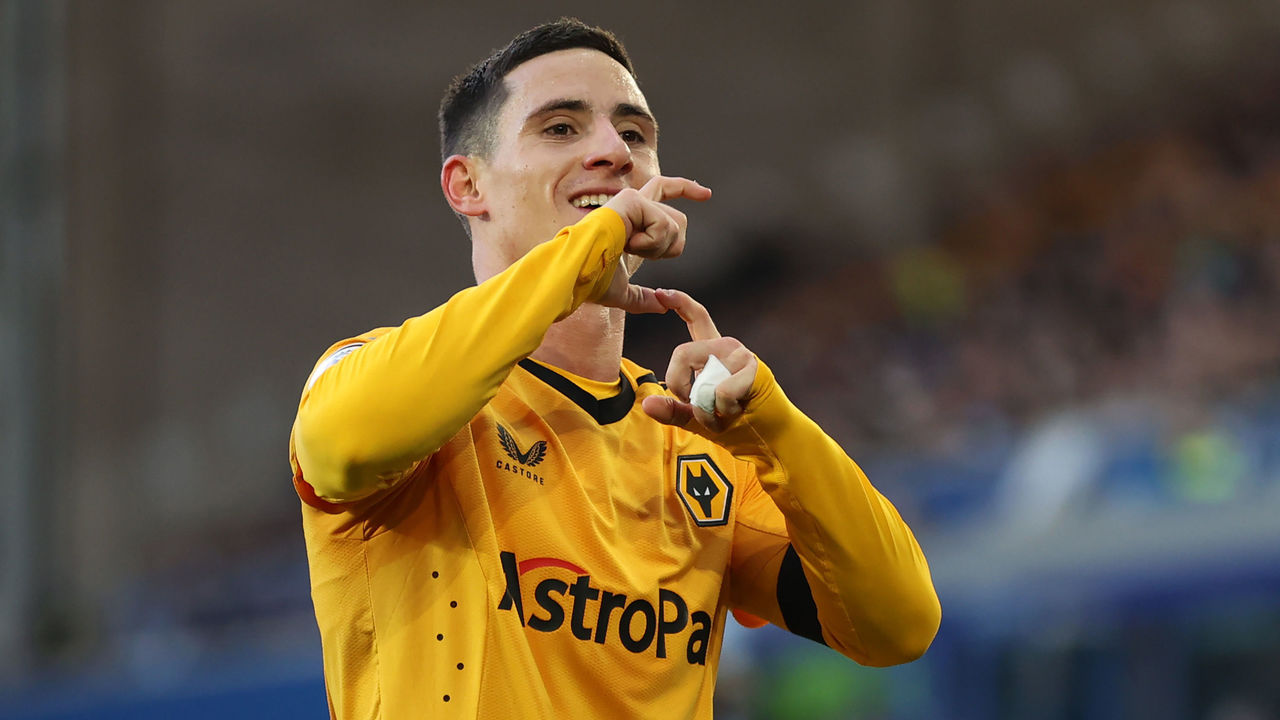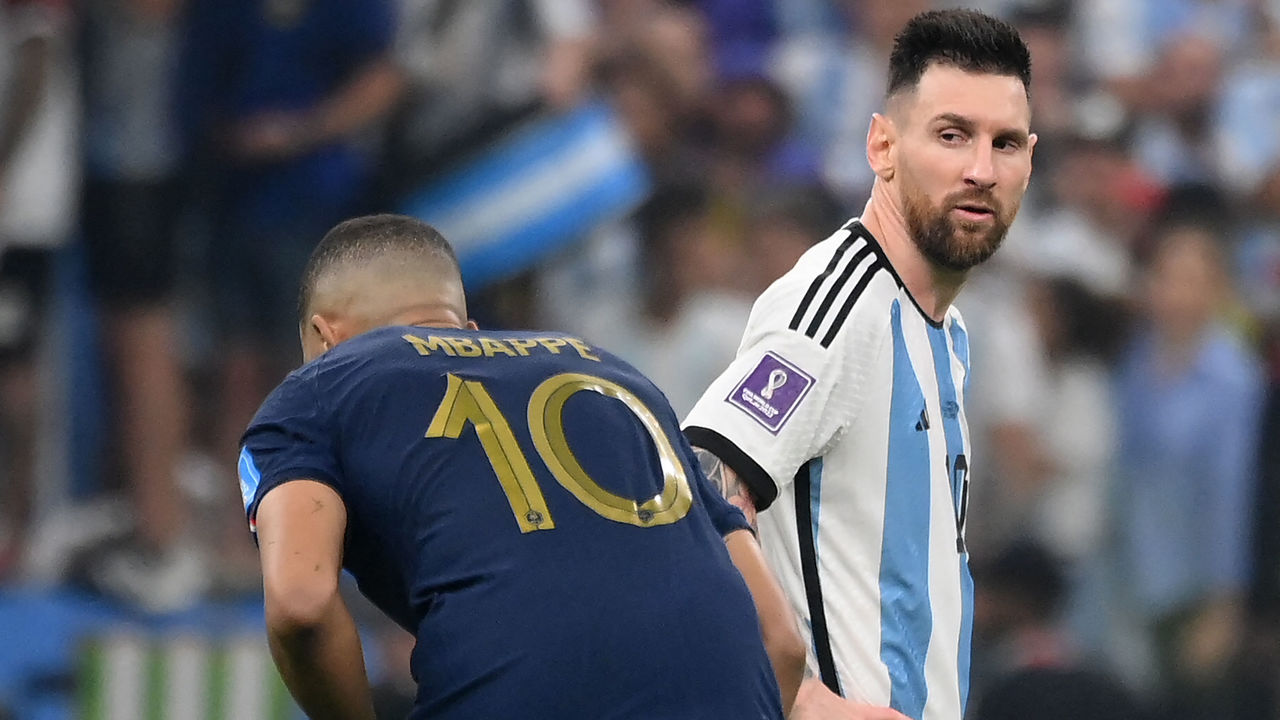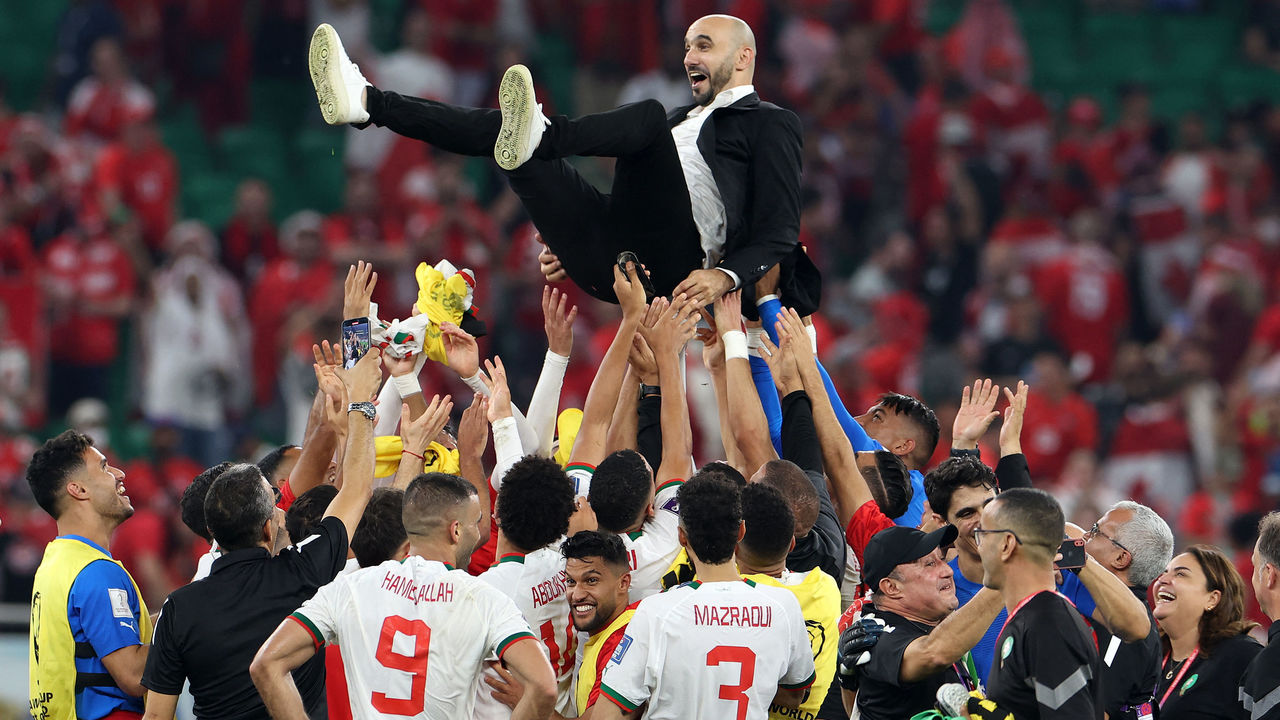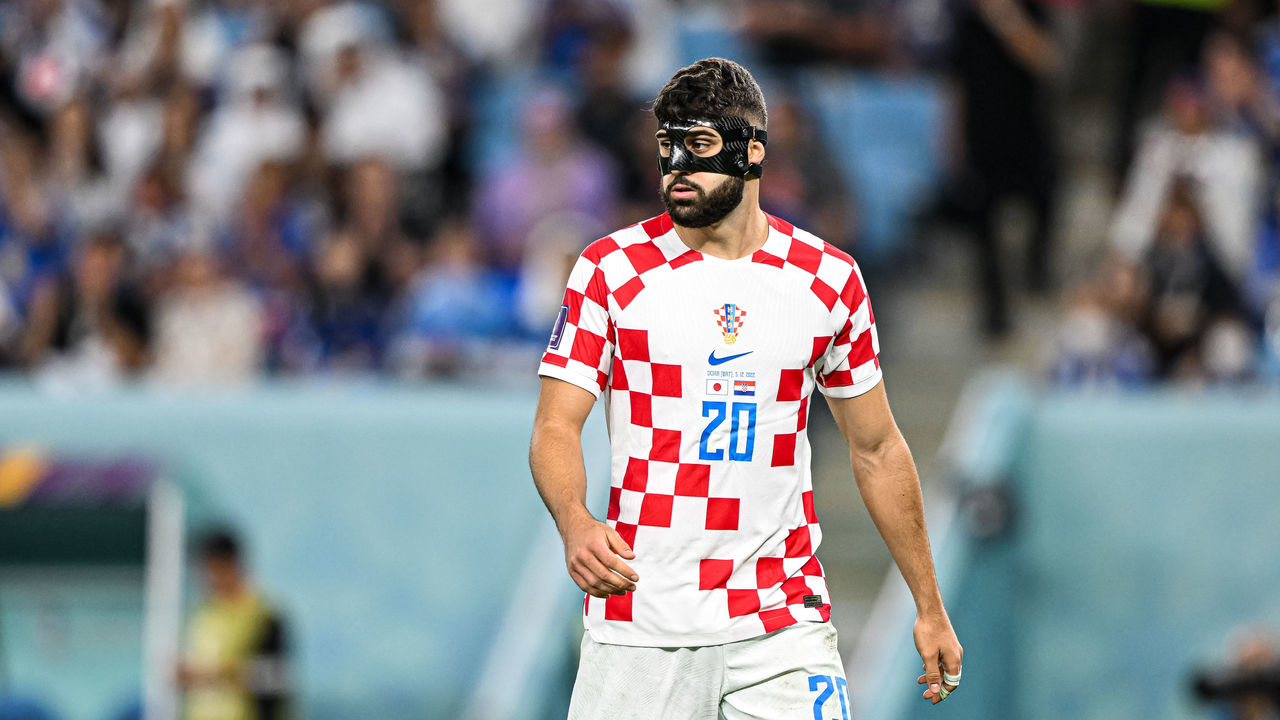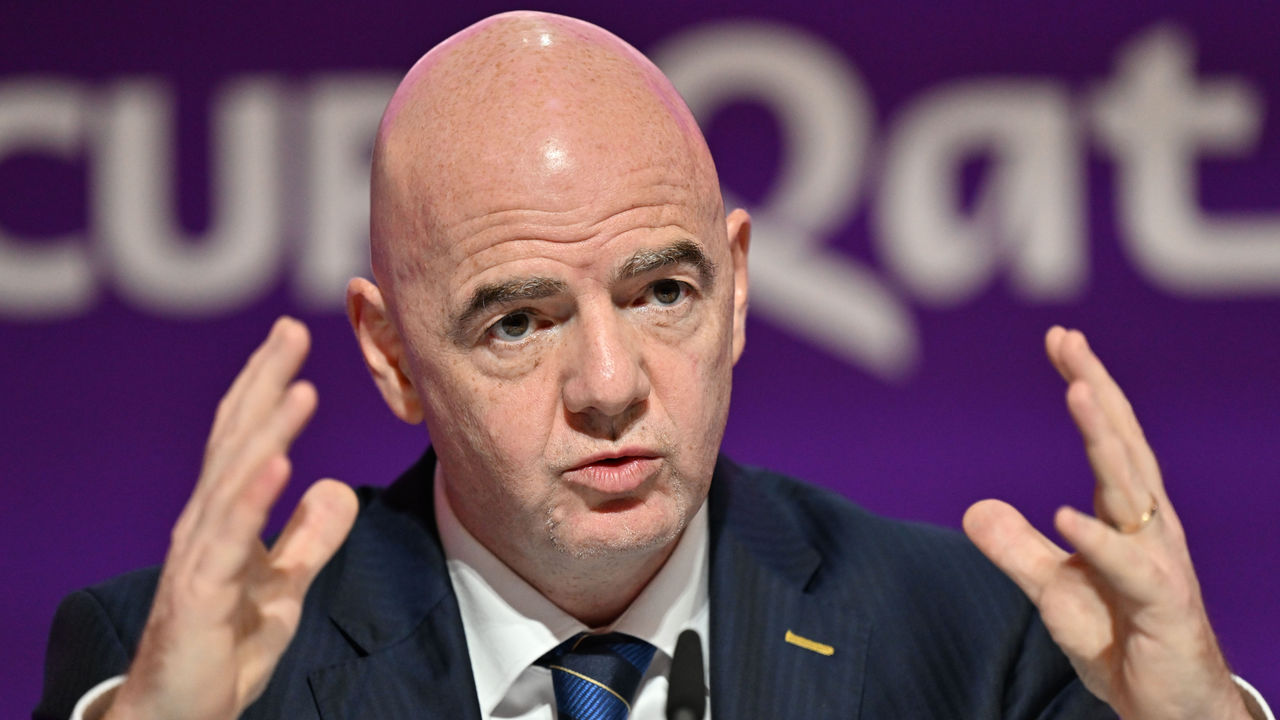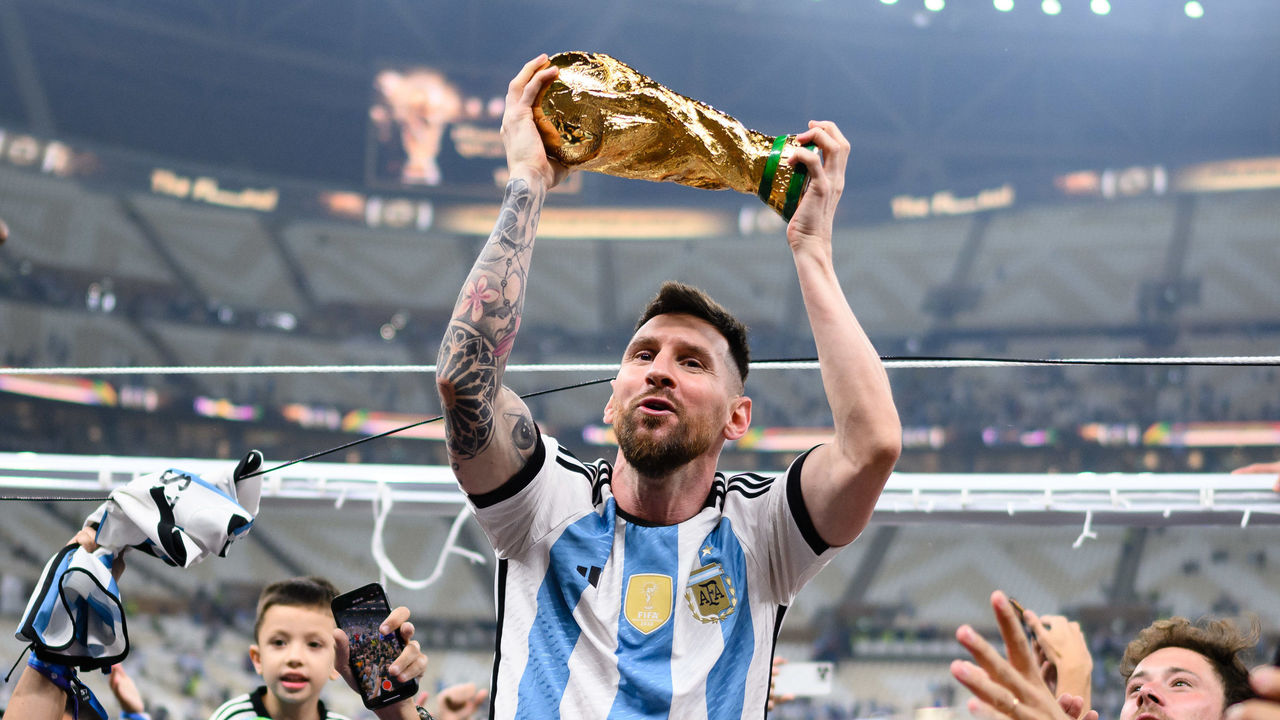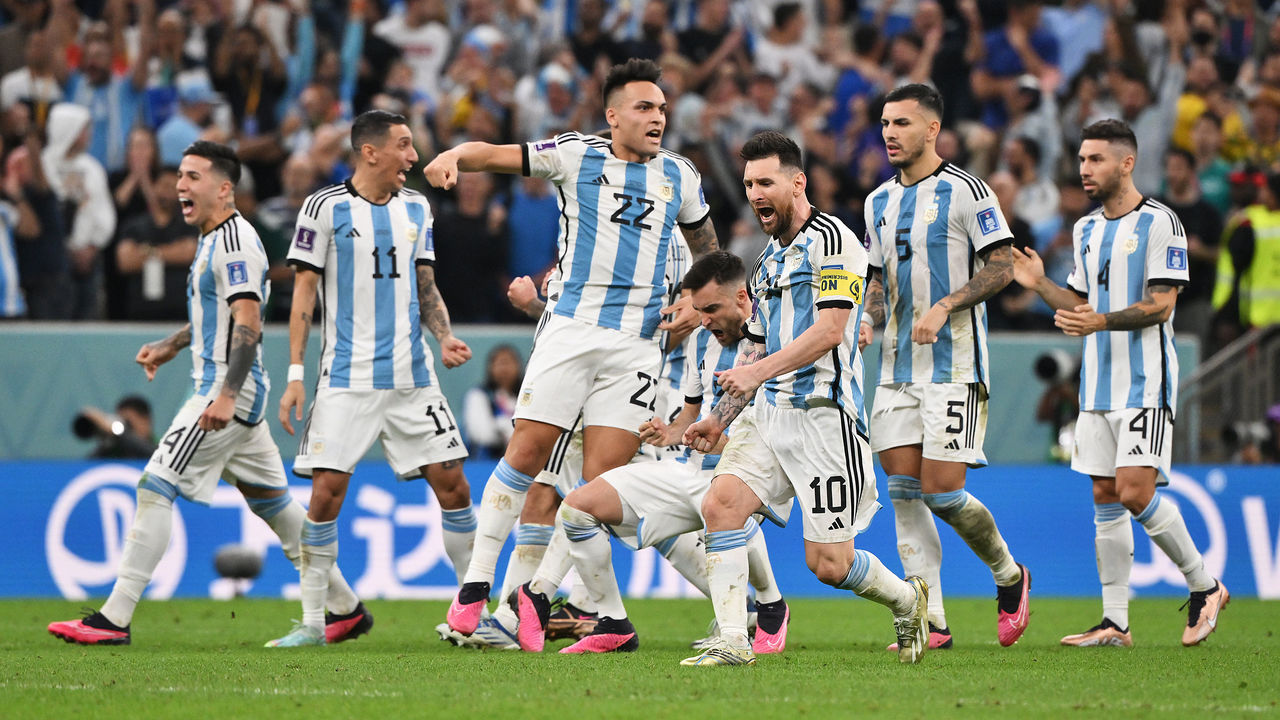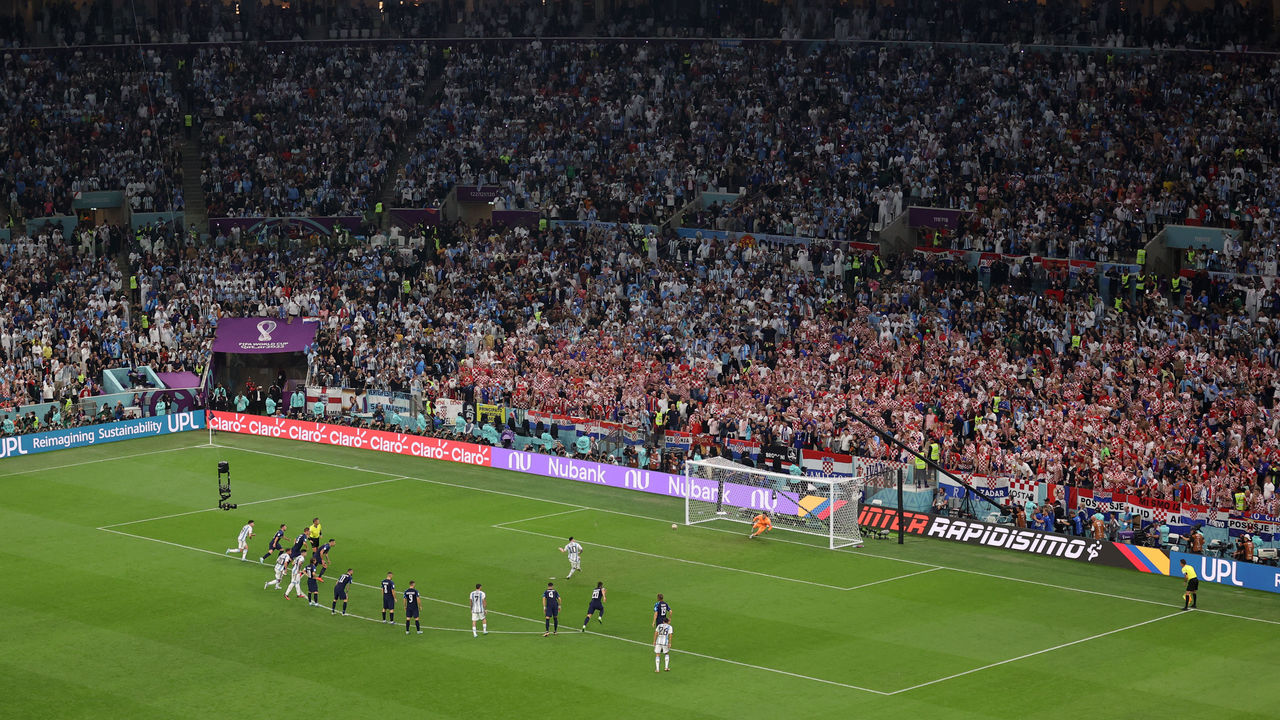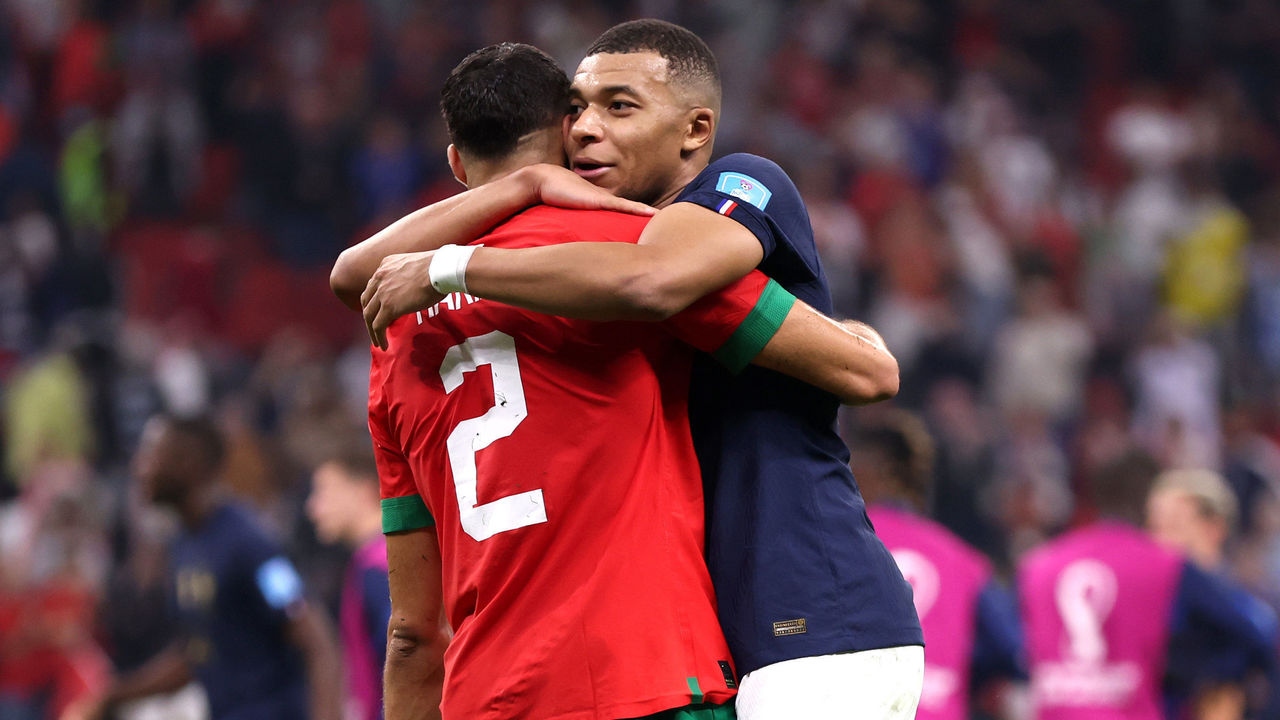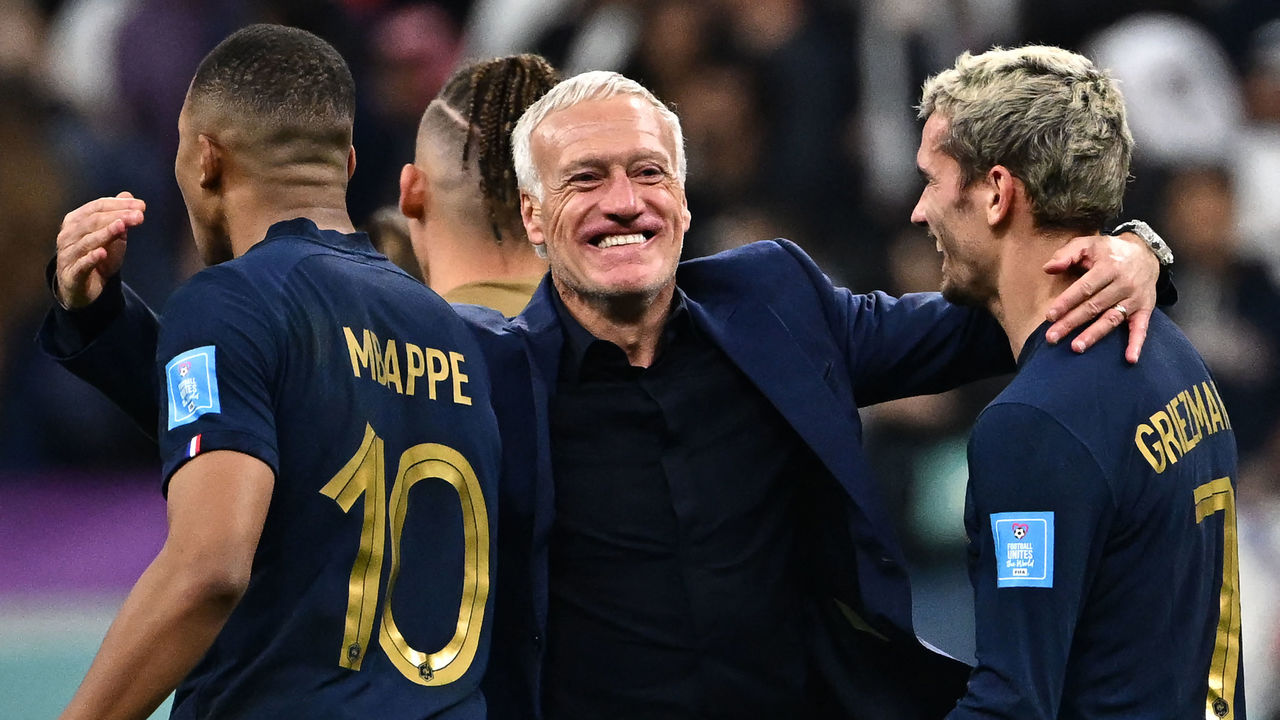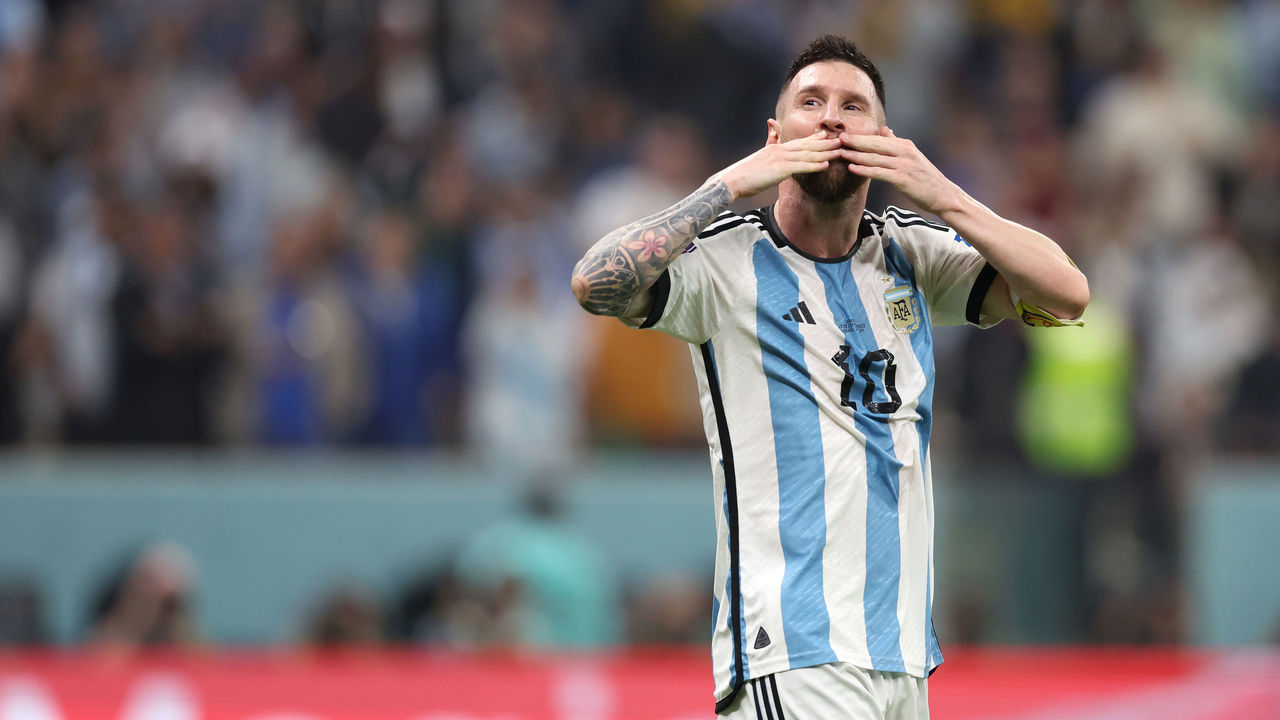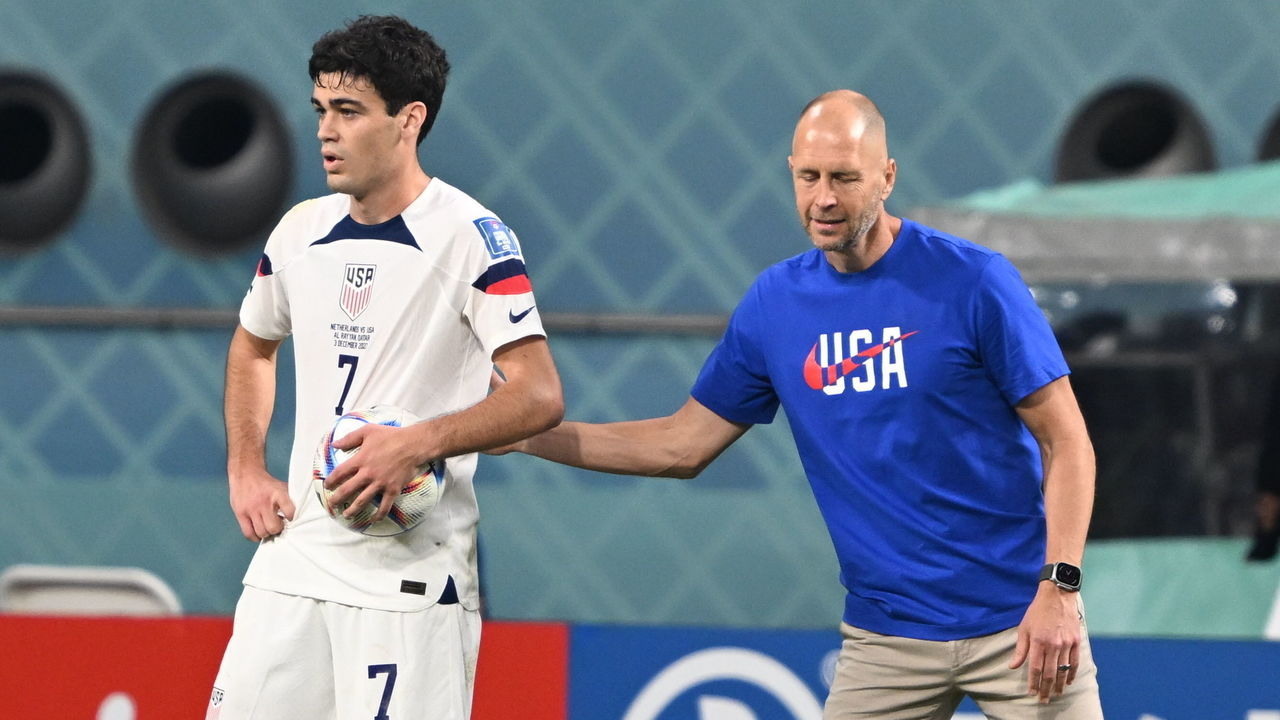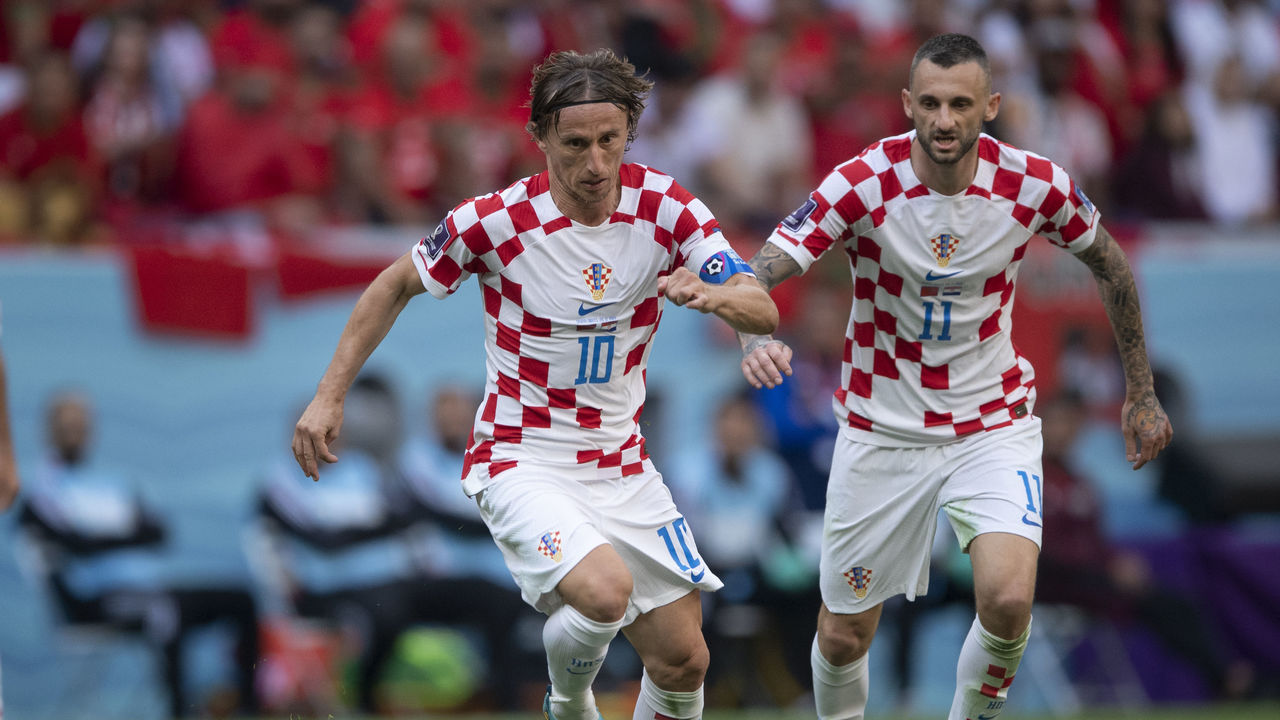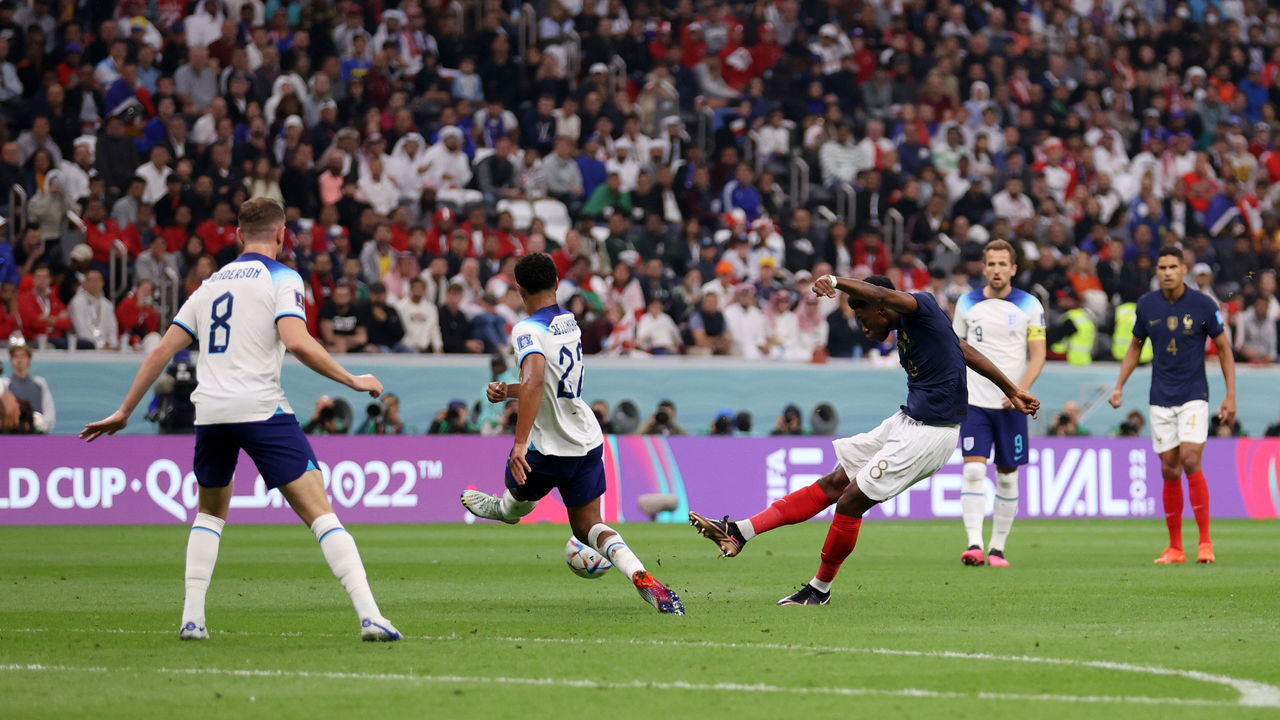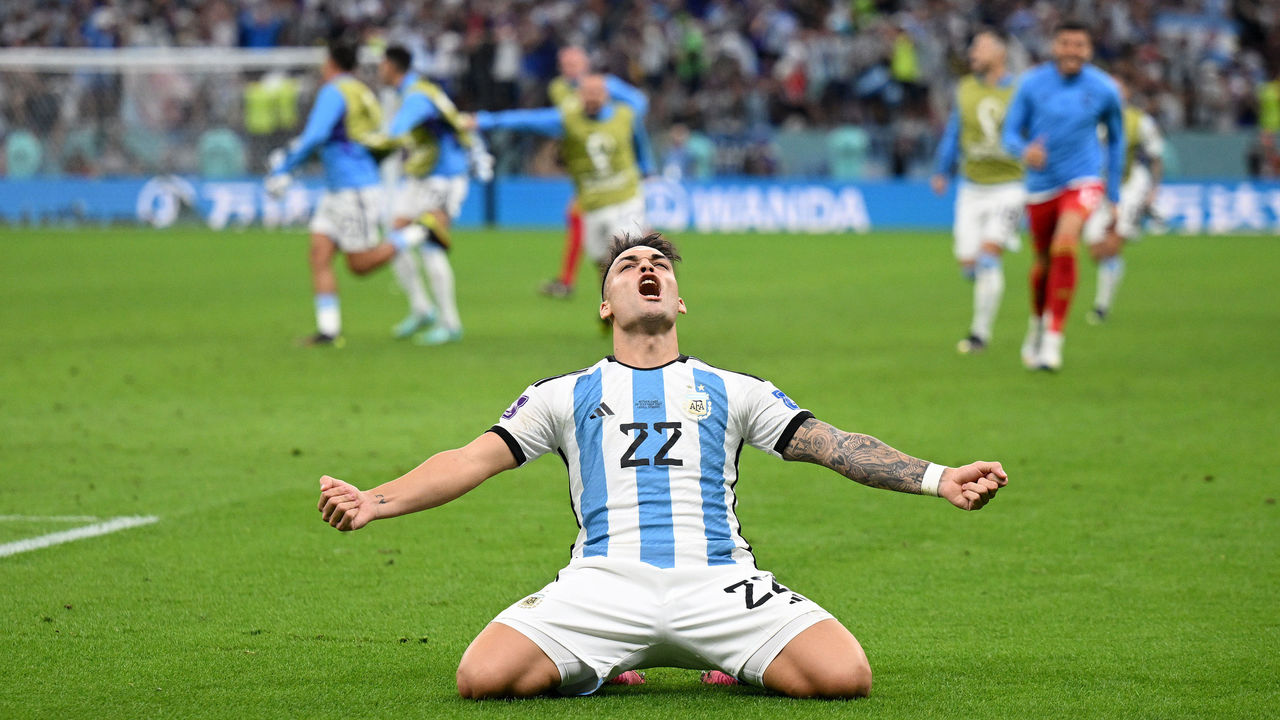-
Premier League is back: Analyzing busy Boxing Day slate of action - December 27, 2022
-
3 thoughts from Argentina's win over France in legendary World Cup final - December 21, 2022
-
Even in a World Cup of twists and turns, it came down to Messi and Mbappe - December 20, 2022
-
Team of the tournament: Best XI at 2022 World Cup - December 19, 2022
-
22 unforgettable moments from the 2022 World Cup - December 19, 2022
-
Messi finally wins World Cup as Argentina dethrones France in epic final - December 19, 2022
-
World Cup final preview: Key questions, prediction for Argentina vs. France - December 17, 2022
-
Why Qatar's sportswashing project is surviving World Cup controversies - December 17, 2022
-
How France held off lionhearted Morocco to make 2nd straight World Cup final - December 16, 2022
-
France's World Cup title defense once seemed unlikely. Now, it's near reality - December 15, 2022
World Cup roundup: Heartbreak for England, history for Morocco
The 2022 World Cup is in full swing. At the end of every matchday, we’ll review the biggest talking points emanating from Qatar and break down all the action on the pitch. Below, we look back on Saturday’s thrilling quarterfinal games.
Illustrious clash lives up to hype
The most anticipated matchup of the 2022 World Cup, at least to date, fulfilled fans’ expectations. These games so often fail to deliver the drama and excitement promised, but France’s 2-1 victory over England Saturday provided a variety of thrills and twists.
Aurelien Tchouameni opened the scoring with a bolt from the blue. England then took over, pinning France deep and looking more likely to win the match after Harry Kane’s equalizer from the spot. Then in the spirit of a true champion, Olivier Giroud delivered a sucker punch for France. England fought back only to see Kane’s second spot-kick balloon over the crossbar. Euphoria and relief for French fans. Despair for England. Shock for everyone else who has watched the assured striker successfully find the net with power and precision from 12 yards on countless occasions. The match – and emotions – fluctuated wildly. This was high-stakes tournament football at its best.
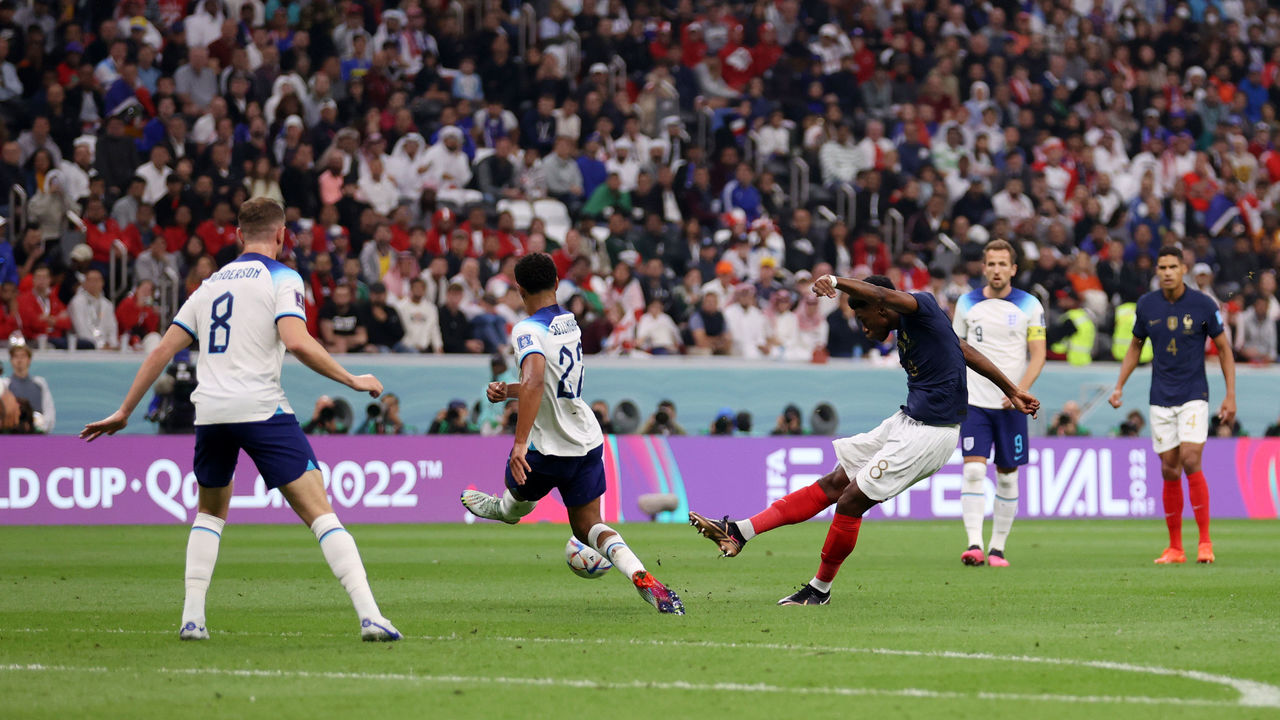
And a fascinating individual battle between Kylian Mbappe and Kyle Walker underpinned it all. What would Gareth Southgate concoct to slow down France’s irrepressible attacking force? His plan worked out for the most part, as Walker rarely ventured forward, sitting back to ensure Mbappe couldn’t exploit space on the break after France won the ball back. Luke Shaw pushed high on the left side to provide balance. The only time Walker did thrust up the field near the French penalty area in the first half, Mbappe pounced, helping to create Tchouameni’s goal in the other direction. Small moments were the game-changers, which is partially what made the contest so intriguing: It felt like it was on a knife edge the entire time.
The rip-roaring foot race between Mbappe and Walker in the second half, in which the Frenchman became one of the only players to ever leave his rapid counterpart in the dust, drew oohs and aahs from the crowd. Everyone was waiting to see it. Walker did a superb job of shutting Mbappe down overall – he didn’t have a shot on target – but the electric forward’s momentary flashes were still spellbinding.
The duel was a microcosm of the entire match: England outplayed France and largely shut the defending champion down but is still heading home heartbroken. The French picked their spots and remain in contention to retain their title, becoming the first reigning champion to reach the World Cup semifinals since 1998. Brief moments made the difference.
A new dawn for African football
The sight of a surly well-traveled foreign coach in charge of an African team has been a common sight for decades. Before Walid Regragui led Morocco to the 1-0 quarterfinal win over Portugal, the only managers to guide an African side to that World Cup stage were Russian (Valery Nepomnyashchy with Cameroon in 1990), French (Bruno Metsu with Senegal in 2002), and Serbian (Milovan Rajevac with Ghana in 2010).
Morocco itself has followed this approach. Of the five coaches to previously lead the country at the World Cup, only one was Moroccan.
But now, Morocco and its regional rivals – and the world by extension – should consider more coaches on the continent. Regragui, who represented Morocco as a player, is the first boss to take an African squad to the World Cup’s final four, and he’s done it by promoting tight bonds within a roster that was previously fragmented under his Bosnian predecessor Vahid Halilhodzic. Regragui built on the defensive foundations left behind while welcoming Hakim Ziyech and Noussair Mazraoui back into the fold, creating a strong unit that has conceded just one goal – and that was an own goal – throughout its five-game run.
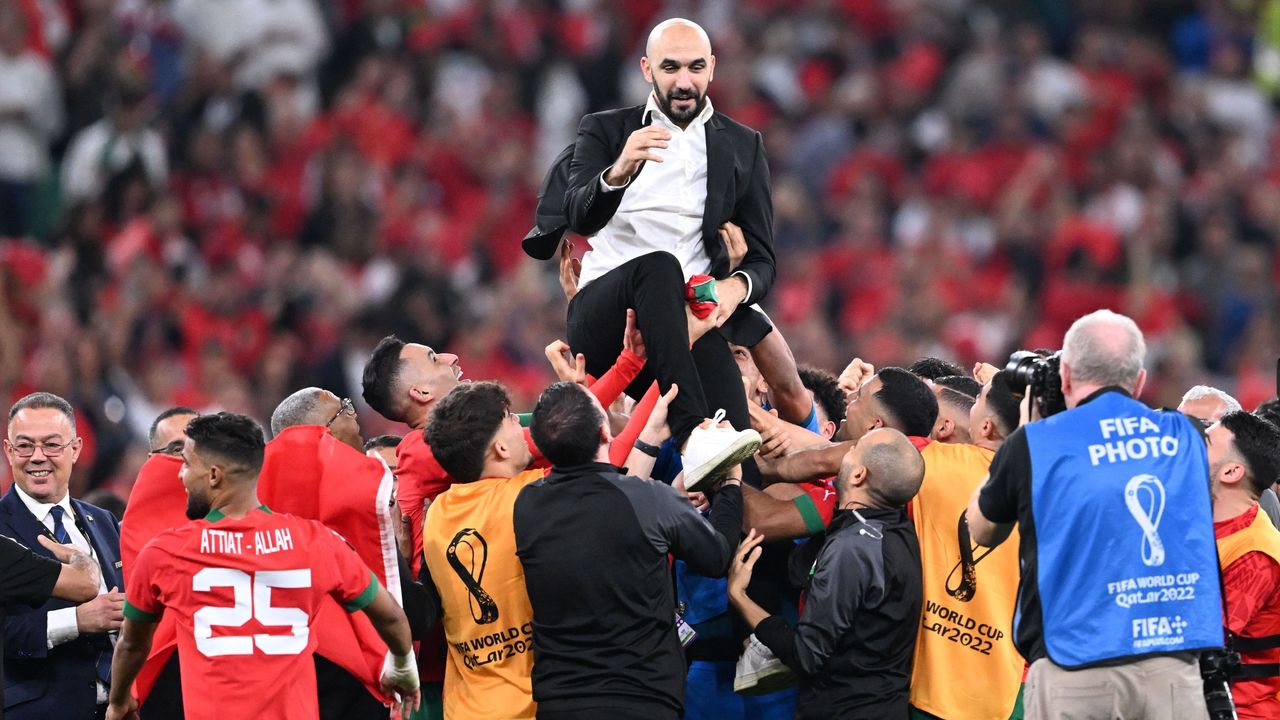
Beating Portugal required some backs-to-the-wall defending and more goalkeeping heroics from Yassine Bounou – it was sometimes desperate. But the victory was another impressive one for an injury-riddled squad. There were last-ditch blocks and timely tackles, but there were also fine examples of evasive midfield play from Azzedine Ounahi and positivity from backup left-back Yahya Attiat-Allah. With better finishing from the substitutes, Morocco would’ve made it 2-0.
Regragui may have put African managers on more clubs’ and countries’ radars. His credentials were already impressive – two league titles in Morocco, the Moroccan Throne Cup, Qatar’s first division, and the African Champions League – but his subsequent success in Qatar should give more respect to his achievements with clubs outside of Europe.
It’s long been the case that Regragui, and other trophy-hoarding African tacticians like Pitso Mosimane, should be higher on big-spending clubs’ lists of targets when they’re on the lookout for a new manager. Regragui could accelerate Africa’s progress in the global game.
Portugal’s anger misguided
Tempers tend to run high after a loss, and more so at the World Cup than in any other football setting – no competition can match the emotional investment and, thus, the output. So it’s understandable players would be totally devastated after bowing out of the tournament, especially in a surprising fashion.
But post-match declarations from irate Portuguese pair Bruno Fernandes and Pepe that Argentine referee Facundo Tello was biased against Portugal because he wanted to make Argentina’s path to the title easier were misguided.
“I don’t know if they’re going to give the (World Cup) to Argentina,” Fernandes said. “I don’t care, I’m going to say what I think and screw them. It’s very strange that a referee from a team that’s still in the cup officiates us. They’ve clearly tilted the field against us.”
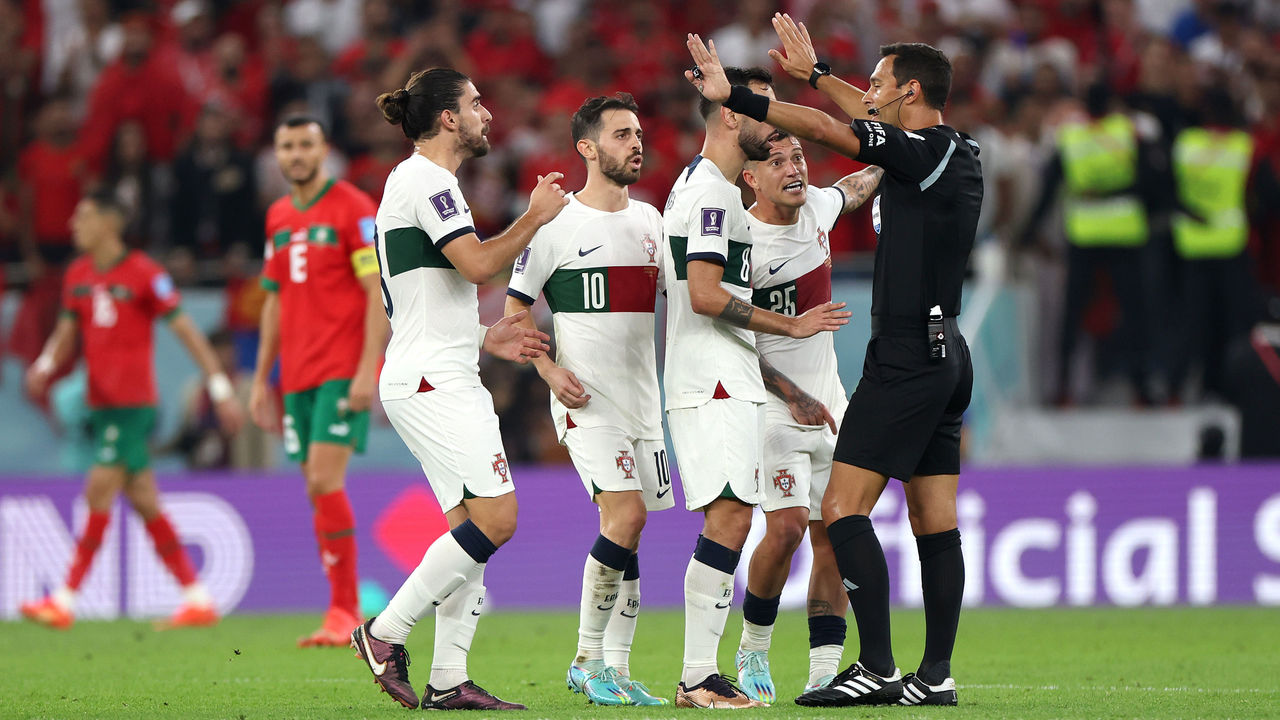
“I think what the referee did today – this is an Argentinian referee. After what Messi said yesterday, it seems there’s something very weird,” added Pepe, referencing Messi’s criticism of the officiating on Friday. “We couldn’t play in the second half because the referee kept stopping the game. I’m very angry, very angry because the referee didn’t let us play.”
After going behind just before the halftime interval, Portugal, despite finishing the match with a handful of attacking players on the pitch – including substitute Cristiano Ronaldo – only had two shots on target. Morocco’s lauded backline and airtight defensive block did their part – of course they did – but the Portuguese often played into the hands of the Atlas Lions, launching crosses into the box instead of playing through the lines. Time and again, towering defender Jawad El Yamiq rose high to head the ball away, forcing Portugal to start all over.
“I think we could have done more, and we failed to do so, so I don’t think we should blame the referee,” Fernando Santos said.
Santos is right. Portugal shouldn’t look for alibis. The team had only ever recorded one World Cup win when trailing at halftime – that came in 1966. After Diogo Costa’s error on Youssef En-Nesyri’s goal, Portugal didn’t do enough to double that total.
What’s next for Southgate?
Southgate can be credited for vaulting England into the 21st century and helping the football-crazed country believe the sport’s biggest prizes were “coming home” after successful runs at the 2018 World Cup and Euro 2020. But England’s wait for a major trophy continues, and despite his positive influence since arriving six years ago, the debate over Southgate’s future as head coach has already begun.
Failure to get the Three Lions over the hump in Qatar is especially damaging for Southgate, given that this is arguably the most talented English team in the 56 years since the nation last won the World Cup. A quarterfinal loss to France is nothing to be ashamed of, as England threatened Les Bleus’ title defense with a brave performance. But this could be the defeat that ends the career of the most successful – and longest-serving – English head coach since Sir Bobby Robson (1982-90).
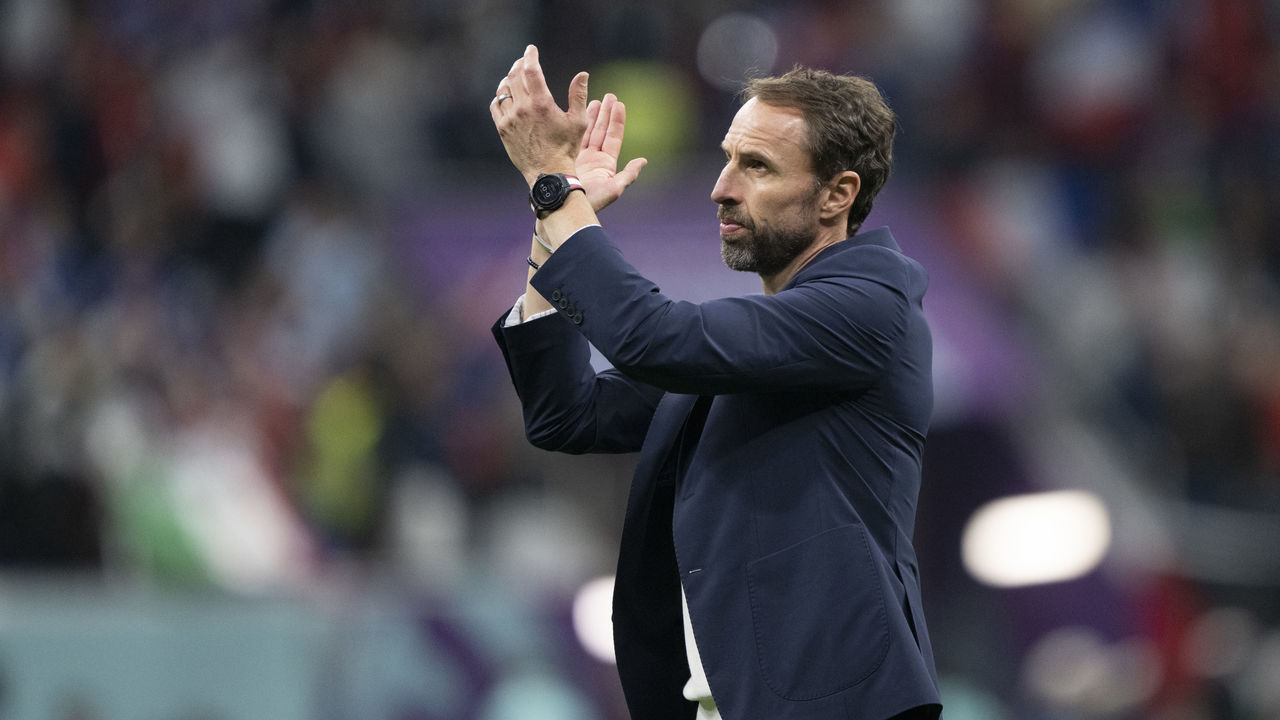
Ultimately, Kane’s gut-wrenching penalty miss will go down as the decisive moment that separated these two heavyweights. However, there were several instances in the game – and throughout the tournament – when Southgate’s tactics and loyalty to familiar players were questioned. He inexplicably preferred Mason Mount to Phil Foden early on in the tournament, while Marcus Rashford was never guaranteed a starting place despite looking like one of the squad’s sharpest forwards. And then there was the head-scratching substitution against France, removing Bukayo Saka in favor of Raheem Sterling amid the Arsenal star’s strong shift.
England’s World Cup drought will have extended to 60 years before it gets another crack. Whether Southgate will be at the helm remains to be seen. Declan Rice said he “loves” playing for Southgate and wants him to stay in charge, but the manager himself will “take a bit of time” to decide on his future. Stay tuned.
Quick free-kicks
France more than just Mbappe
Mbappe is human after all. The French phenom was uncharacteristically subdued against England, ceding possession on several occasions and failing to produce a single shot on target. It was a rare display of mediocrity from a player who’s developed a reputation for routinely blowing everyone’s minds with his unmatched brilliance on the pitch. At this stage in Mbappe’s career, any opposing team that can keep him off the scoresheet should claim that as a victory. Unfortunately for England, though, France showed Saturday it doesn’t need Mbappe’s greatness to win big games. His lingering threat to burst out of nowhere with a goal obviously helps distract opponents, but Les Bleus are so stacked with talent that they can withstand brief episodes without Mbappe tearing teams to shreds. It’s unlikely the soon-to-be 24-year-old will put on another display like that in back-to-back games, but the French are in safe hands with Antoine Griezmann and Giroud, a pair who’ve played considerable roles in France’s return to the semifinals.
Titanic tussle on the cards
Hakimi is ready to meet Mbappe in the semifinals ? pic.twitter.com/8VF5GLESmq
— ESPN FC (@ESPNFC) December 10, 2022
After taking on Walker Saturday, Mbappe’s next task will be even more difficult, as he’ll go toe-to-toe with Achraf Hakimi in the semifinals. The two friends – club teammates at Paris Saint-Germain – are two of the fastest and most explosive players in world football. Their tussles on the training pitch in Paris are surely a sight to behold – if your eyes can keep up with two speedy blurs racing back and forth, of course. Now we all get to see what those battles are like on one of the sport’s grandest stages. Get your popcorn ready.
England will be back
England, after falling behind to Tchouameni’s audacious strike, dictated play against the reigning world champion for large stretches. The Three Lions outplayed France, created better chances, and often looked more likely to score. This was one of the best performances of Southgate’s entire tenure – and England lost anyway. That’s the harsh reality of tournament football. This sport can be cruel. But the pieces are in place for the English to be a force at major tournaments for years to come. Rice, Foden, Saka, Mount, Rashford, Trent Alexander-Arnold, and Jude Bellingham are all 25 or younger. So is Reece James, who missed the tournament through injury. The future remains exceedingly bright for an England squad still learning what it takes to win on the biggest stage. That takes time. The Three Lions will be back.
Stat of the day
Barring a shocking twist in 2026 – when he’ll be 41 years old – Ronaldo’s illustrious career will end without a World Cup knockout goal.
0 – Cristiano Ronaldo has failed to score in all eight of his knockout stage appearances at the World Cup (inc. third place play-off), going 570 minutes without scoring and taking 27 shots in the process. Exit. pic.twitter.com/HyTrpoUad0
— OptaJoe (@OptaJoe) December 10, 2022
Tweet of the day
“Waka Waka.”
This time for Africa!! ??? #WorldCup
— Shakira (@shakira) December 10, 2022


